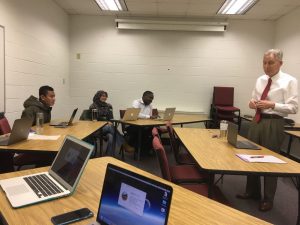 I have observed that students express their opinions and reflections on the material they study. Here, it is expected that you read the content before the lecture, and class time is used for reflection, seeking clarification, finding and comparing different viewpoints.
I have observed that students express their opinions and reflections on the material they study. Here, it is expected that you read the content before the lecture, and class time is used for reflection, seeking clarification, finding and comparing different viewpoints.
Lecturers in Universities and teachers in schools emphasize thinking, and they seek and expect your personal view. Sitting in class with students who are expressive has provided a window into the thoughts of my students. Perhaps they too feel the same way about issues, probably they would also like to have a greater say.
And here, having a personal opinion does not simply mean saying “No” to what the others are saying. It is not simply liking what the author wrote. Students state their opinions, express their reasons and are open to what other students have to say.
They have built it into their system gather opinions. There are formal ways, with lecturers requiring you to submit reflections, sometimes before and sometimes after the lecture. And they want your opinions in all forms. Some will ask you to record a podcast or video reflection, or even a drawing (the call it a visual)
Sometimes they dwell on an issue a little too long, you think. Sometimes you get impatient, feeling they are covering too little content. I think it is by asking students to read ahead of time that the lecturers get around this.
Their system is not perfect, but I think there are lessons we can draw from it and it raises several questions
Questions that Arise
The focus on thinking causes me to wonder;
- How would this play out in a situation where students don’t have access to reading materials, or where they just won’t read or where there is no culture of contributing in class?
- What accommodations would teachers in Uganda have to make in light of “too much” content to be covered?
- What if I gave students a chance to respond to a fieldwork question from a study they did by recording either a video or an audio and sending it to me via WhatsApp rather than insist on writing an essay all the time?
- How would teachers harness the creative energy of youths when they were taught and raised in a different system? How do you handle the situation where you have hundred plus students in the same room, and all want to make some contribution?
- At what age does this kind creative and reflective style start from? I reason it must have started much earlier, not in just in secondary schools, or kindergarten. Perhaps it starts at home, with parents giving a chance to children to air their views.
- If this reflection starts at home, how do parents raise children to be so? Wouldn’t such children question everything we say? I recall once seeing a mother who bought shoes for her 9-year old daughter and she wouldn’t take them because what she wanted was a different pair she had seen on the internet.
- What if parents allowed children to express themselves freely?
- And if we think the individual voice and reflection is important as employees (whether teachers, bankers, secretaries or doctors), is your voice important where you work? Do your opinions count and are you expected to give them?
- As managers and leaders, before we ask teachers to open up spaces for students, do we open up spaces for the employees we have? Do we seek, treasure and honor people’s opinions or do we stop at people agreeing with our policies? How do we treat dissenting views? How do we treat those that don’t share our opinions? Do we see them as giving us alternative options, an opportunity to interrogate our assumptions or do we label them as rebels (disloyal) and difficult employees?
- How do we make honoring personal opinions a norm, a rule and not an exception to the rule in a society where the young are supposed to keep mum!
And why is this important, you may ask. The president recently said that the human resources of the country constitutes the true wealth of the nation. That human resource needs to be able to think to address emerging problems and exploit new opportunities. It is also widely believed that students are now educated for jobs that don’t yet exist. So they need to learn to think, to be creative so they can thrive in the future economy. Can we just continue training students to act like human robots, whose only task is to regurgitate crammed facts at national examinations? As schools and parents now celebrate candidates’ scores at national exams, is it not prudent to ask the question, what do these grades really mean?
I wish to submit to you all that each and every one of us has a role to play, whether we are parents, teachers, employees, policy makers, leaders etc. it’s our obligation to create spaces and opportunities necessary to raise a generation that will take us to the next level. That, my friends is our mandate.
Speak Your Mind